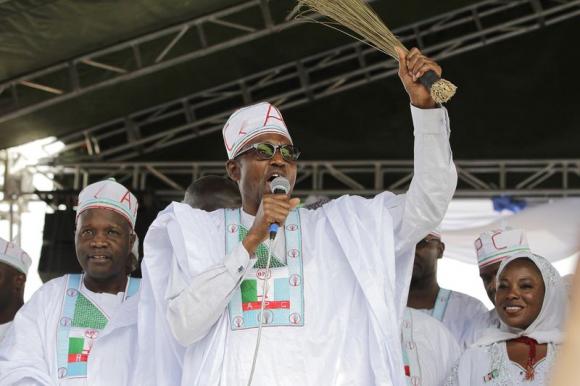When the maverick writer, Dr Reuben Abati, made a humorous anecdote in his recent article about the implementation of the Stamp Duties Act through our bank accounts, we all laughed it off.
That’s who we are really as a people. We take burning issues that deserve exhaustive national debate for granted. Seriously, we don’t debate policies that impact our lives most.
There has always been that sudden wilt of interest in the discussions as we yield and turn to look for our daily bread. The National Assembly that we have is the most feeble and uninspiring, when it comes to policy debates. So it’s a double jeopardy as lawyers would say.
We all know that most of the lawmakers arrived in Abuja unprepared and they will do nothing to improve themselves for as long as they receive their commission without serious accountability to their constituencies on how they vote during debates.
Advertisement
Last year, When President Muhammadu Buhari campaigned around the country, he didn’t talk about raising tax on the poor and the middle-class, though he knew the economy had fainted under President Goodluck Jonathan and he would need to resuscitate it somehow.
Yes, the bad situation of the economy may not be that clear to him until he assumed office, but the sin of the prodigal politicians who milked Nigeria dry shouldn’t be visited on poor Nigerians who looked to Buhari for hope.
So a blanket order by the Buhari-led government to impose stamp duty on individual accounts through its agency, the Central Bank of Nigeria, is a misstep and broken promise to protect the poor.
Advertisement
For a refresher, on Friday, January 16, the CBN through a circular directed all Deposit Money Banks to commence immediate charges of N50 per every N1,000 or more deposit made either by electronic transfer or physical cash deposit on individual accounts. It is to be called stamp duty charge.
The circular exempted inter and intra bank transfers from one personal account to another and equally exempted salary and savings accounts, giving the impression that the poor and the middle-class are not being targeted. However, in a question of true or false, the impression will fall under false.
This is the arithmetic: there is hardly any bank user in Nigeria without two accounts, even when they are domiciled in the same bank.
The banks often encourage you to open current and savings account together and where you’re unexciting or soporifical about it, bankers will let you see hundred reasons why you should have a checking account.
Advertisement
Now, with the implementation of the stamp duties policy, we’re all victims of a copycat policy that’s not implemented the same way the United Kingdom Government, the United States, China, Australia and other countries with same policy long before us implemented theirs.
No other country has implemented stamp duties policy through unnecessary deduction from customers account, except Nigeria. It is illegal. Period!
In many countries, stamp duty is charged on property purchase. Simply put, Stamp duty is a tax on written documents (‘instruments’) and on certain transactions.
Indeed, the most recent idea of this Stamp Duties Act implementation was first mooted in January 2013 by the immediate past Postmaster General, Mallam Muri Baba, who piggybacked on the revenue generation strategy of the legacy agency, Posts and Telecommunication department (P&T)—that birthed NITEL and NIPOST—to improve the revenue base of NIPOST and that of the federal government.
Advertisement
At that time, NIPOST said that it derived its powers to enforce the policy from the Stamp Duty Act 2004 and the NIPOST Act 2004 and went ahead to appoint three deposit money banks, that include: First Bank, Stanbic IBTC Bank and Unity Bank to lead other financial institutions.
If you ask me, the implementation suffered instant defeat, because NIPOST was clever with truth.
Advertisement
The postal agency obtained what it called “appropriate clearance” from the Central Bank of Nigeria (CBN) to engage banks and other financial institutions on improving the administration of its statutory mandate and then relied on the Stamp Duties Act 2004 and NIPOST Act 2004 as amended by the National Assembly in 2010 to get N50 off poor bank depositors.
It cited fortuitously Section 89 of the Act as a provision for the law while using Section 92 as provision for offences in relation to violation of the Act. Certainly, NIPOST simply thought of Nigerians as fools without knowledge of the law. The section 89 (2) makes case for putting adhesive stamps bought from NIPOST on receipts acknowledging payments as consideration for commercial transactions and not for bank deposits.
Advertisement
Do you wonder why the CBN has become clever with words in its own directive to the deposits money bank on the same matter, it is because there’s no substance to rely on in law for deduction of customers’ fund under Stamp Duties Act.
The CBN directive was silent on the exact provision of the Act it is relying on for its directive. It did not also make the content of the Financial Regulations it is equally relying on known.
Advertisement
The earlier directive issued by CBN on July 17, 2009 speaks to what the Stamp Duties Act really means.
In a circular number BSD/DIR/GEN/CIR/03/015 signed by Samuel Oni, the director of banking supervision, the CBN asked all banks to act with specificity to goods purchased or services rendered.
The circular reads:“The attention of the Central Bank of Nigeria has been drawn to the non adherence to the provisions of the Stamp Duties Act 2004 by some securities subsidiaries of banks, despite several appeals from the Nigerian Postal Service. It has been observed that most brokers/ dealers do not affix revenue stamps on their contract notes contrary to the provisions of the Stamp Duties Act 2004, thus depriving the Government of accruable revenue from securities transactions and inhibiting the development of the postal system in Nigeria.
“Banks are hereby reminded of the provisions of the Stamp Duties Act 2004 under: i. Section 89(2) that every receipt given by any person in acknowledgment of goods purchased or services rendered should be denoted by an adhesive postage stamp worth N50 issued by the Nigeria Postage Service; and ii. Section 14(2) which makes it mandatory for a receipt to be so denoted. All banks are by this circular advised to ensure that their securities subsidiaries are in full compliance with the provisions of the Stamp Duties Act 2004 failing which the penalties spelt out in Section 92 of the Act would apply,”
Now, what has changed between the 2009 circular and that of 2016? The difference is in the detail.
The desperation to look for money at all cost without a better idea may affect the positive image already built for this government, when the poor revolts.
This policy is an example of official extortion that must be pushed back through court actions. I think the litmus test should start with customers suing the deposit money banks for illegal deductions and that will get the music on for CBN to reverse itself.
And in a country where the idea of “family support” is critical to the survival of many out-of-job families, a gift of money can be easily misrepresented as commercial transaction and charged for stamp duty since it’s a deposit into an account. From the exemption contained in the Act, it is clear that money deposited in a bank is not liable to stamp duty, therefore Buhari should tax the rich and not the poor.
The poor shouldn’t pay for the sin of the rich. The prodigal politicians who plundered our commonwealth should bear the brunt. Imposition of stamp duty on individual accounts is no Robing Hood effect, its robbing Peter to pay Paul.
Follow me on twitter @adeolaakinremi1
This article first appeared in THISDAY
Views expressed by contributors are strictly personal and not of TheCable.
1 comments








Your comment..what a disaster. I did not voted APC into power to unleash me, enough of this…abeg you never promised to rob us in you campaing to our door step rather a stinpid allowances that was an empty promised. Lol!.